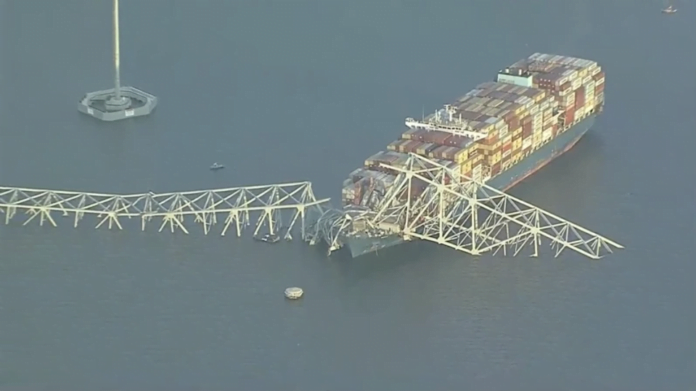On March 27, 2024, a sudden and catastrophic event unfolded in Baltimore as the Francis Scott Key Bridge collapsed, trapping several vessels, including four U.S. military cargo ships. This incident has raised serious concerns about the impact on local economies and global supply chains.
Military Vessels Stranded Amidst Crisis
The four stranded military cargo vessels, part of the U.S. Military Sealift Command’s Ready Reserve Fleet, were on standby for potential deployment. Now, they remain immobilized along with nearly a dozen other ships, further intensifying logistical disruptions.
As a result, maritime traffic has been rerouted, and the Port of Baltimore has been closed indefinitely, exacerbating existing supply chain challenges.
Economic and Logistical Impact
The Port of Baltimore plays a crucial role in international trade, handling millions of tons of cargo annually. It serves as a primary entry point for imported vehicles into the United States. The shutdown raises concerns about perishable goods, shipping delays, and broader disruptions in the already strained global logistics network.
Economists warn that the collapse could have severe economic consequences for Baltimore. The port is a major economic driver, providing thousands of jobs and generating billions in revenue each year. The immediate impact is expected to be widespread, affecting local businesses, automakers, and retail supply chains.
Ripple Effects on the Automotive Industry
The effects extend beyond Baltimore’s economy. Global automakers such as Ford anticipate disruptions in their supply chains. The shutdown may lead to delays in production and delivery, as manufacturers struggle to reroute shipments to alternative ports.
The incident highlights the fragility of global supply chains, prompting discussions on the need for diversification and resilience to mitigate future risks.
National Security Concerns
In addition to economic consequences, concerns are mounting over the readiness of the four military vessels stranded in Baltimore. These ships are designed to deploy within five days in the event of a national security emergency. The prolonged port closure could compromise military logistics and emergency preparedness.
Ongoing Recovery Efforts
Authorities are working to clear debris and restore port operations, but the full extent of the disruption remains uncertain. Industry experts caution that recovery could take weeks or even months, depending on the structural damage and logistical hurdles involved.
Final Thoughts
As developments unfold, Morsilla News will continue to monitor the situation and provide real-time updates. The Baltimore bridge collapse serves as a stark reminder of the vulnerabilities in both infrastructure and global trade networks, reinforcing the importance of strategic planning and risk mitigation for the future.

